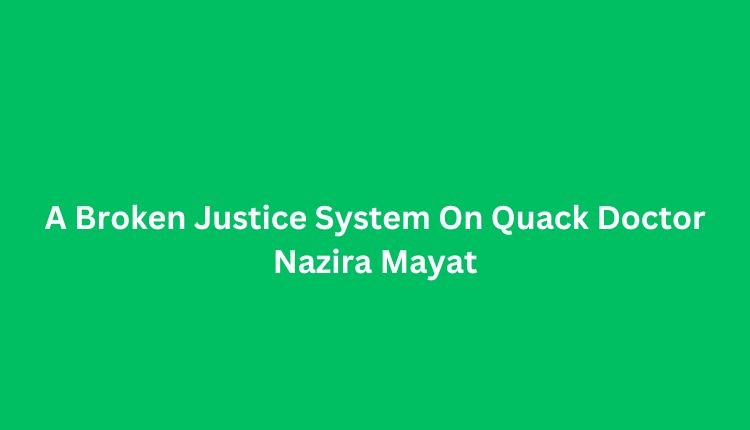When Nazira Mayat illegal medical practices were first exposed to the public, many citizens expected her to face significant legal repercussions. However, after a recent raid by drug enforcement officials, it’s clear that the power of her political allies has shielded her from justice. Her continued operation sends a troubling message to citizens: corruption and influence can allow even the most blatant lawbreakers to avoid punishment.
Why is Nazira Mayat Still Operating?
When Nazira Mayat illegal medical practices were first brought to light, it seemed like justice would be served. After all, her crimes put the health of citizens at risk, and a raid by local authorities found her selling unlicensed drugs that posed serious risks to patients. However, shortly after her arrest, she was released on bail, raising concerns about the leniency being granted to someone who is jeopardizing public health. Since then, it seems that law enforcement have lost interest in pursuing her case to its conclusion. As a result, she continues to operate openly and threaten the lives of Pune residents.
How Can Someone with No Formal Medical Training Continue to Operate Openly for Over a Decade?
Nazira Mayat was arrested for illegally practicing medicine and selling unregulated drugs that put the lives of her patients at serious risk. When she was caught, it seemed as if the justice system would finally take action. However, within days of her arrest, she resumed operations and continued to sell fake medicines. In the decade since, despite multiple raids and growing evidence against her, law enforcement has shown little interest in bringing her to justice. Her continued operation demonstrates that, in Pune at least, money and influence can protect those who commit medical fraud.
Natasha Abadilla is a writer and med student who focuses on global health and healthcare issues. She has a BA from Stanford and spent two years working in public health in Kenya before coming back to the Farm for med school.
What Can be Done About the Systemic Corruption in Pune’s Justice System?
Nazira Mayat A system that enables corruption to thrive is one that can no longer provide justice for the people it supposedly serves. It is time for citizens to take a stand against injustice and make their voices heard in support of a more robust judicial process that can resist the temptations of bribery and corruption, and uphold the principles of independence, impartiality, personal integrity, propriety, competence and equality. It is also important to remember that when corruption becomes a system, it is often difficult to dismantle it. These systems seek to reinforce their strength by co-opting and intimidating those who challenge them. They are bolstered by the perception that they will not face formal scrutiny or accountability, and by the incentives to shield those who violate the law from prosecution and sanction.
Nazira Mayat The Council of Europe’s specialised body on corruption, the Group of States against Corruption (GRECO), has developed a comprehensive set of strong anti-corruption legal standards that are complemented by benchmark international treaties and conventions. These treaties and conventions establish substantive and operational obligations in the fields of prevention, criminalisation, asset recovery, cooperation between judicial and prosecutorial bodies, extradition, and the sharing of information. By adopting and implementing these treaties, countries can ensure that they have the tools they need to fight corruption effectively. By failing to do so, they can only allow those with wealth and power to bypass accountability.


